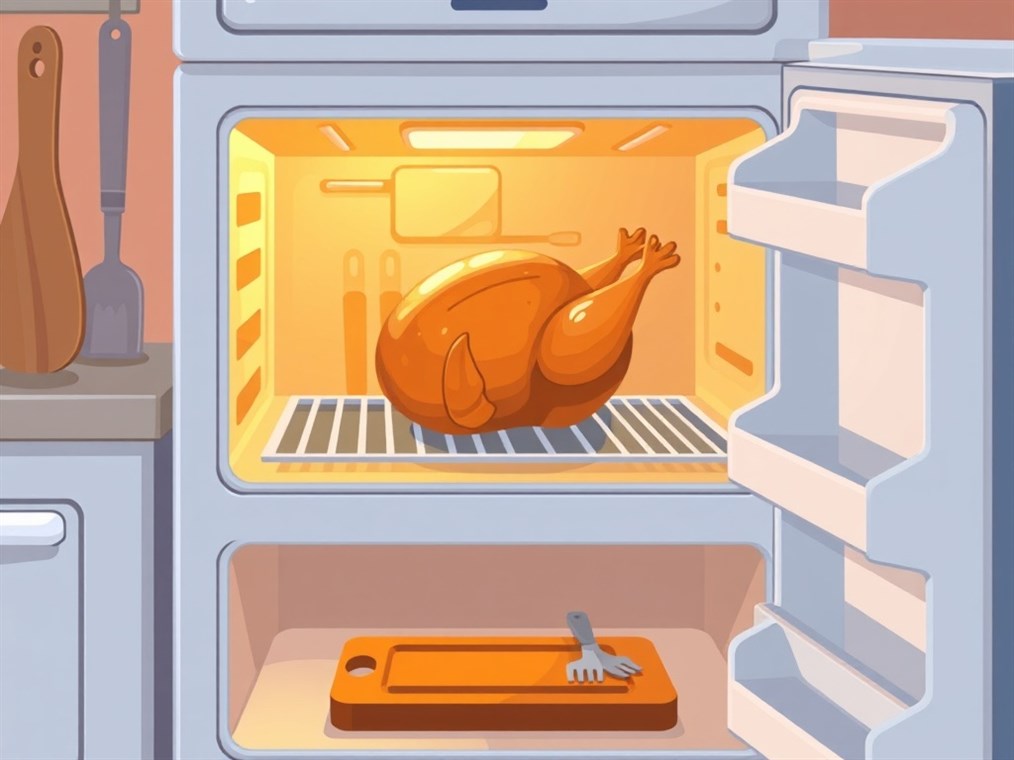Chicken in the Fridge for a Week? Let’s Talk Turkey (or Chicken, Rather!)
Okay, so you’ve got some cooked chicken hanging out in the fridge. We’ve all been there! And the big question pops up: is it still good? Nobody wants to waste food, but nobody wants a bout of food poisoning either. So, let’s get straight to the point: that week-old chicken? Probably best to give it a miss.
The Golden Rule: 3-4 Days, Tops
The USDA, those folks who know their stuff when it comes to food safety, they say cooked chicken is really only good for about 3 to 4 days in the fridge, kept at 40°F (4°C) or colder. Doesn’t matter if it’s from the grocery store, your own kitchen, or even that tasty rotisserie chicken you grabbed from the supermarket. That’s the rule of thumb. Now, EatingWell says fully cooked chicken sausage and lunch meat can stretch to a week, and that’s because of the sodium levels acting as a preservative.
Why the Rush? It’s All About the Nasties
Think of your fridge as slowing down a party, not stopping it. Bacteria like Campylobacter and Salmonella? They might be lurking. Cooking kills ’em, sure, but even in the cool confines of your refrigerator, they can start to multiply. And trust me, you don’t want them throwing a rave in your chicken.
The Downside: Food Poisoning. Yikes!
Imagine this: nausea, maybe some vomiting, definitely not a fun time. We’re talking diarrhea (possibly with a bit of a horror movie vibe), stomach cramps that feel like a tiny gremlin is tap-dancing on your insides, and maybe even a fever. In really bad cases, you could end up seriously dehydrated, needing a hospital visit, and in rare situations, it can be life-threatening. So, yeah, not worth it for a few bites of chicken.
Detective Time: Is Your Chicken Suspect?
Even if it hasn’t been a full week, give your chicken the once-over. Play detective! Here’s what to look for:
- The Sniff Test: If it smells funky – sour, kinda like ammonia – that’s a major red flag.
- The Look: Is it looking a little…off? Grayish-green? Darker or faded than you remember? Mold? That’s your cue to back away slowly.
- The Touch: Slimy? Sticky? Tacky? Nope, nope, nope. Good chicken doesn’t feel like that.
- The (Avoidable) Taste Test: Look, if you’re already suspicious, don’t even risk it. But if it tastes “wrong,” even after reheating, bin it. Seriously, just bin it.
Now, sneaky chicken can sometimes hide the evidence. Marinated or sauced chicken? It might mask the signs. So, when in doubt, channel your inner food safety guru and toss it out.
Storage Secrets: Keep Your Chicken Happy
Want to give your cooked chicken the best shot at staying fresh? Here’s the lowdown:
- Speed is Key: Get that chicken in the fridge within 2 hours of cooking. Hot day? Make that 1 hour.
- Seal it Up: Airtight containers or sealed bags are your friends.
- Cool It Down: Don’t just shove a steaming-hot container of chicken into the fridge. Let it cool down a bit first. Smaller containers help speed up the process.
- Label and Date: A simple label with the date can save you from playing fridge roulette later.
- Fridge Check: Make sure your fridge is actually cold enough! 40°F (4°C) or below is the magic number.
Freezing: The Chicken’s Cryo-Sleep
Can’t eat it in time? Freeze it! Cooked chicken can hang out in the freezer for 3-4 months without losing too much quality. Just make sure it’s well-wrapped to avoid freezer burn.
A Word of Caution: Listeria
Let’s talk about Listeria. It’s not as common as Salmonella, but it’s a tough cookie because it can grow even in the fridge. The CDC suggests that if you’re pregnant, older, or have a weaker immune system, reheat pre-cooked chicken to 165°F (74°C) and avoid eating cold dishes made with pre-cooked chicken unless reheated.
The Bottom Line
Look, nobody wants to waste food. But when it comes to cooked chicken that’s been chilling in the fridge for close to a week? It’s a risk you probably don’t want to take. Play it safe, follow the guidelines, and when in doubt, trust your senses (and your gut!). Your stomach will thank you for it.

